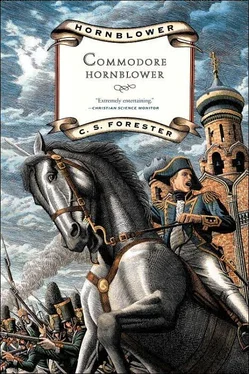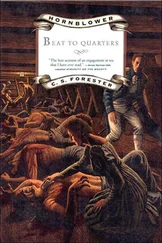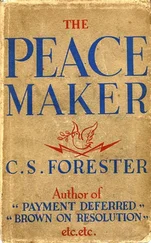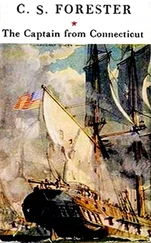Warming himself at the fire burning on the flagged floor of the church, drinking hot tea through his chattering teeth, Hornblower looked round at these men of iron who showed no sign of fatigue and hardly any of cold. He himself was too chilled, and, oddly, too fatigued, to gain much benefit from the chance of resting for a couple of hours on the trusses of straw laid out beside the high altar, but Essen snored volcanically until the moment when his aide-de-camp shook him awake. Outside it was still dark, and colder than ever, when the horses were brought up to the church door for them to mount.
“I better come with you, sir,” said Brown. “I got myself a ‘orse.”
How Brown had done that Hornblower could not imagine, seeing the difficulties of language. Hornblower supposed Brown had learned to ride in those incredibly distant days at Smallbridge. The cavalcade moved slowly in the darkness towards the Mitau suburb, the horses slipping and stumbling in the snow; Hornblower found himself wishing he had been able to retain his blanket when he mounted, for it was colder than ever in the faint grey light. Suddenly from far ahead of them came a sullen flat thud, and another, and another—field-guns firing a long way off.
“Diebitch is up to their rear-guard,” said Essen. “Good!”
There was enough light now to reveal the desolation of their surroundings as they approached the deserted siege-works. They could look down into the littered trenches; there were the batteries, with the shattered siege-guns standing drunkenly at the embrasures, and here was a dead horse, lying on its back, its belly shrouded with snow, out of which its legs pointed stiffly at the grey sky. And here was the main camp, rows and rows of little huts; mostly only two or three feet high, with the dead remains of camp-fires already buried in snow. Outside one hut, larger than the others, lay a soldier swathed in the grey capote of the French Army. He was face downwards and not dead, for they saw his feet move.
“Have they been fighting here?” conjectured Essen, puzzled; there was no sign of blood.
Someone dismounted and turned him over; his face was mottled with mulberry-coloured marks, and his eyes, though open, were unseeing.
“Keep a way!” shouted one of the aides-de-camp suddenly. “That is the plague!”
Everyone drew away from the dying man, and then they realized that the plague was all around them. One of the huts was full of dead, another was full of the dying. Essen shook his horse into a trot, and the party jingled away.
“It is in our ranks already,” said Essen to Hornblower. “Kladoff had ten cases in his division two days ago.”
This, the first march in retreat of the invading army, was already finding out the weaklings. There were dead men, sick men, dying men alongside the track they were following, despite the fact that no fighting had taken place along it—Diebitch at the head of the pursuing force was on the Mitau road away on the left front, where the guns were still firing occasionally. When at last they reached the point where the track joined the high road the signs of real fighting began; dead and wounded soldiers, Russian, French, and German, where the Russian advance-guard had clashed with the rear-guard. Then they caught up with the Russian columns plodding sturdily up the road, and trotted past their interminable length, one division and then another; the men were silent with the exertion of stepping out as fast as their legs would carry them under their heavy knapsacks, and this ten miles of fast marching had greatly modified the first jubilation of pursuit.
“Macdonald has made a good retreat,” said Clausewitz, “at the cost of leaving his sick and his guns behind. I wonder how long he will be able to keep this pace up?”
Hornblower did not trouble to enter into the discussion. Saddle soreness was making him abstracted, apart from his fatigue and his general feeling of malaise. But he had to be able to report to his government that he had followed up the retreating army for at least one march on its way back to Germany; it would be better if it were two or three. And there was something else. He wanted to catch up with the Prussians, even if it were the last thing he did—and it was odd that he had this feeling that it was the last thing he was ever going to do. His head was whirling, and there was something comforting about the knowledge that Brown was just back there with the mounted orderlies.
A messenger brought back news from the advance-guard, and Hornblower heard Clausewitz’s explanation as if in a dream.
“The Prussians are making a stand at the fork in the roads ahead,” he said. “They are covering the retreat while the other two army corps get away by the two roads.”
It was strange that this was just what he was expecting, as if it were a story he had already heard being retold.
“The Prussians!” he said, and without willing it he pressed his legs against his horse’s sides to urge it to a faster pace towards where the flat reports of the guns showed where the Prussians were holding back the advance-guard. The headquarters party was clear of the main body now, trotting along the deeply-rutted road, hemmed in here by a dense wood of coniferous trees. Beyond the wood the desolate landscape opened up to reveal a low ridge up which the road mounted ahead of them. On either side of the road here a brigade of the Russian advance-guard was halted, a battery of artillery was in action, and up on the ridge could be seen the Prussian infantry columns, black blocks against grey fields. Over on the right a grey-clad Russian column was plodding across country to turn the flank of the position, while between the two forces Russian horsemen—Cossacks—trotted in ones and twos on their shaggy ponies, their long lances vertical at their sides. A watery sun broke through the clouds at this moment, seeming merely to accentuate the gloominess of the landscape. A general came up to salute Essen, but Hornblower did not want to listen to what he had to say. He wanted to press forward towards the Prussians, and as the horses of the party followed the example of his own they moved steadily up the road, Essen half unconscious of the movements of his horse as he listened to the general’s report. He was only recalled to his surroundings by the howl of a cannon-shot which pitched at the roadside near him, throwing snow and earth in all directions.
“What do we think we’re doing?” he asked. “We’ll be getting ourselves shot in a moment.”
Hornblower was staring forward at the Prussian army, at the glitter of bayonets and the flags black against the snow.
“I want to go up to the Prussians,” he said.
The discharge of the battery close at hand drowned the words Essen said in reply, but what he meant to say was plain enough.
“I am going,” said Hornblower stubbornly. He looked round and caught Clausewitz’s eye. “Are you coming too, Colonel?”
“Of course he cannot,” expostulated Essen. “He cannot risk being taken.”
As a renegade, a man fighting against his own country, Clausewitz was likely to be hanged if ever the Prussians laid hands on him.
“It would be better if he came,” said Hornblower, woodenly.
This was a strange feeling of simultaneous clairvoyance and illness.
“I’ll go with the Commodore,” said Clausewitz suddenly, making what was probably the bravest decision of his life. Perhaps he was carried away by Hornblower’s automaton-like recklessness.
Essen shrugged his shoulders at this madness which had descended upon them.
“Go, then,” he said. “Perhaps I may be able to capture enough generals to exchange for you.”
They trotted forward up the road; Hornblower heard Essen bellow an order to the battery commander to cease fire. He looked back; Brown was trotting after them, a respectful five lengths behind. They passed close to some of the Cossack light horse, who looked at them curiously, and then they were in among Prussian skirmishers, who, from the shelter of rocks and inequalities in the ground, were taking long shots at the Cossacks. No one fired at them as they rode boldly through. A Prussian captain beside the road saluted them, and Clausewitz returned the salute. Just beyond the skirmishing line was the first formed infantry, a Prussian regiment in battalion columns of companies, two on one side of the road and one on the other. The colonel and his staff were standing in the road staring at the odd trio approaching them—the British naval officer in his blue and gold, Clausewitz in his Russian uniform with the row of medals, and the British seaman with cutlass and pistols at his belt. The colonel asked a question in a loud dry tone as they approached, and Clausewitz answered it, reining in.
Читать дальше












